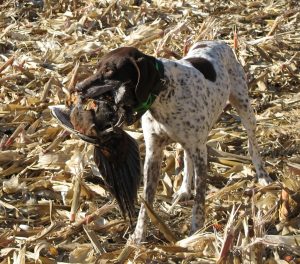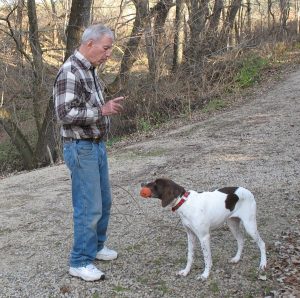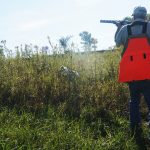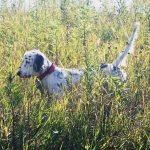Back to Basics: Retrieving
Pointing Dog Pointers
By Bob and Jody Iler
To coin a phrase from an old country song—sometimes in training your pointing dog, just as in life—you have to go “back to the basics.” Developing your dog is always an ongoing process, whether you’ve successfully brought your pup along to the ‘started dog’ level, or have an adult dog that you consider to be “finished.”
Pointing dogs can get rusty or sloppy if they’ve not been worked or trained for a good deal of time. On the flip side, if they’ve been trained with too much pressure, they may also sour on the very attributes that made them star pupils as beginners. And of course, dogs that have had just the bare minimum of training with no consistent reinforcement can’t help but develop issues that become problems.
Some examples of these issues include blinking or busting birds (not the same thing!); crouching or lying down on point; gun shyness; bolting or ranging out too far; working too close; hard or soft mouth; poor response to commands given; and loss or lack of interest in birds, hunting and/or retrieving. The list goes on, and we’re sure you can can add a few of your own to it.
Whatever the problem, “Back to the basics” should be your mantra!
Over the years, we’ve had many dogs that we’ve trained come back to our kennel each fall for a refresher course, or tune-up before hunting season. Even with these dogs, we always start with the basics. We’ll treat them just as new trainees; we review their response and performance on yard work, handling in the field, and finding, pointing and retrieving birds. That way, if some sort of issue has come up with the dogs while they were back with their owners, we can catch it in the beginning or basic stage of our tune-up.
Sometimes the problems are man-made. For example, one young fellow picked up his Drahthaar from our kennel in October, and against our earlier advice, went directly from our place to meet his buddies for a several day hunt on opening weekend. We didn’t hear from him until the following January, when he sheepishly called to report a handling problem with her and ask for our advice on what to do.
From day one, his exuberant dog had hunted her heart out and done all the things that came so naturally to her; but there’d been no time to bond back with her owner. Repeated hunts with a group had failed to cement or improve that bond. It didn’t take long for his talented little dog began to self-hunt, a preventable man-made fault. We addressed this issue by going back to the basics of handling in the field, and this time, her owner continued to work with her and keep a good thing going.
This month, we’ll discuss some retrieving issues that develop with the pointing dog. Retrieving can become sticky in several areas.
Let’s start out with a pointing dog that retrieves ‘naturally’ versus a dog that has been ‘force-broken’ to retrieve (we like to call this the ‘trained retrieve’). A dog that has been through the trained retrieve program will generally deliver the bird to hand each time. The ‘natural retriever’ is easier to train and work with, but this dog’s retrieve is not as predictable or reliable. Natural retrievers may drop birds halfway back to you or refuse to pick them up in hot or adverse weather conditions.
Natural retrieving is really not ‘taught’ but rather, encouraged, with fun play in puppies and as young dogs mature, fostered through positive reinforcement. Once the dog is enthusiastically running out and picking up birds and holding them, it’s simple to add the ‘here’ (come) command and use the checkcord to guide the pup back to you.
When competing with other dogs in field events, most handlers put their dogs through a trained retrieve program to ensure consistent retrieves. We’ve written about our program in the 2001 March-April and May-June issues of The Pointing Dog Journal and in web columns since then. This can be a long process that puts stress on a dog.
We don’t recommend the trained retrieve until a dog has been hunted at least a couple of seasons and has developed a love and enthusiasm for birds and hunting. Also, by waiting a season or more to begin the trained retrieve, sometimes the dog that didn’t start out as a natural retriever will actually start retrieving on his own! But if he doesn’t and the retrieve is important to you as a hunter or field competitor, then you can begin the trained retrieve. Once learned, problems with the trained retrieve can be addressed by going back to the step-by-step program to see where the weak link lies.
But what about the natural retriever that begins to lose interest in retrieving? Think back to when this dog was a pup and enjoyed running out and retrieving various objects and eventually birds for you. What has changed since then?
Are too many birds being shot over your dog in one session? This can cause your dog to start leaving the downed birds and just going off to continue the hunt. Are other dogs hunted with your dog that ‘steal’ the retrieve? Too many dogs on a hunt can lead to lots of issues, including fighting over a bird and engendering aggression problems. Go back to the basics: just you and your dog and one or two birds shot in a session, to focus on the issue. Are you having fun with the retrieve and rewarding your dog for a good retrieve? Or is it becoming like work, and too much of it, so that the dog is losing interest?
Does your dog pick up the bird lightly and drop it on the return to you? Does your dog grab the bird and crush or pulverize the bird? In both of these instances, teaching the hold command can work wonders. Once this command is learned, the dog that drops the bird is cautioned to hold as he returns to you. The dog that crushes the bird learns that he is to hold the bird, not mangle it.
Has your dog developed the habit of picking up the bird and running in circles around you, or running away from you, rather than bringing it to you? Or playing keep away as in a game? Back to the basics of the here command! Get out the checkcord and don’t allow your dog the opportunity to run away from you on the retrieve; rather, encourage him firmly to come to you with the bird.
As we develop our pups they often seem to do so well that some of these steps are not taken or are overlooked. Then, as time progresses and the pups mature, bad habits can arise that need to be addressed with a creative and careful look at why they are occurring, and by then going back to the basics.
Pointing Dog Pointers features monthly training tips by Bob and Jody Iler, who own Green Valley Kennels in Dubuque, Iowa. Bob and Jody have trained pointing dogs for over 35 years and have written many articles for The Pointing Dog Journal.







